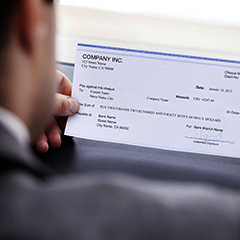Be Cautious When Accepting Checks
April 24, 2015 | Business Plans, Fraud Prevention
 It may seem like checks are less common for Maine-based small businesses than they used to be. However, check fraud continues to cost individuals and small businesses billions of dollars every year. Even though forged checks have always been a problem, inexpensive laser printers and easily obtained check-quality paper make check fraud more of a problem today than ever before.
It may seem like checks are less common for Maine-based small businesses than they used to be. However, check fraud continues to cost individuals and small businesses billions of dollars every year. Even though forged checks have always been a problem, inexpensive laser printers and easily obtained check-quality paper make check fraud more of a problem today than ever before.
When a small business accepts checks, it’s important for owners and employees to have some knowledge of the payment system as well as what to look for when taking a check from a customer.
Look for Alterations
All checks contain a nine-digit routing number in the bottom left-hand corner; with the first two digits indicating which Federal Reserve Bank will handle the check. Forgers often change this routing number. All business owners and employees should be aware of the routing number of the closest Federal Reserve Bank. A routing number that seems altered or discolored is a good indication of a bad check.
Another sign of a possible bad check is if there is no perforated edge on one side. A check that is printed on a home printer would be missing this perforated edge. Of course, there are people who legitimately print checks themselves, but even those usually have some sort of perforations.
Another consideration is that the check itself is legitimate, but the person trying to use it is not. Payroll and other checks are routinely stolen. Read our blog post about direct deposit, and how this can help combat the problem.
Inspect Signatures
Of course, all small businesses should have a policy of checking the signatures on checks. Ideally employees should be able to match them against the signatures on the check writers’ driver’s license or other identification.
Owners and staff members should not pay attention to the appearance of the check presenters; they should be way more concerned about the appearance of the checks themselves.
Consider “Checks and Balances”
Companies can be at risk when they are issuing checks as well. Small business owners should examine check stock and account balances regularly to look for discrepancies. A good way to deter internal fraud is to have different people write checks and reconcile bank accounts, and to limit the number of employees who are authorized to write corporate checks.
Get professional help: Filler & Associates can help Maine-based small businesses learn more about ways to minimize employee fraud and theft. Financial institutions that issue checks probably offer things like watermarks and other security features. Payroll cards, on which the company loads electronic payments, are also gaining in popularity.
The best defense against check fraud is to stop it from happening in the first place. Call Filler & Associates for more ideas on how to cut down on this crime.
